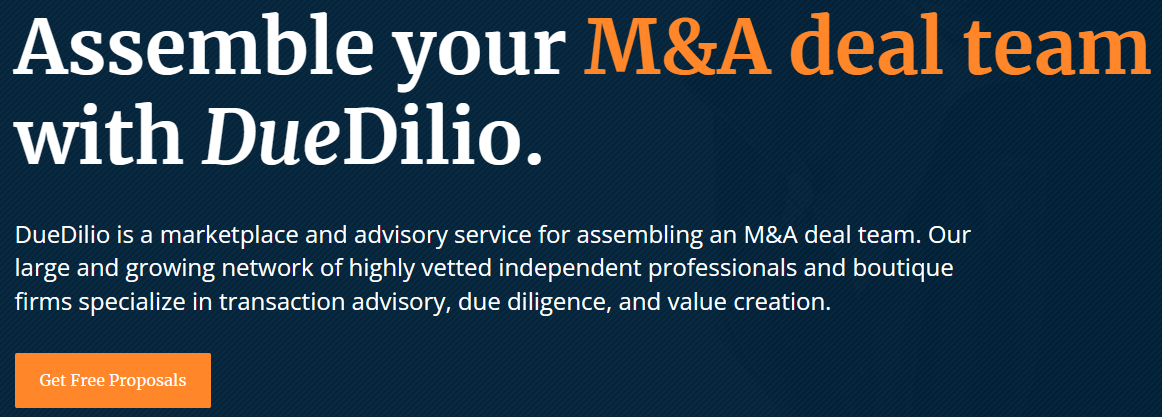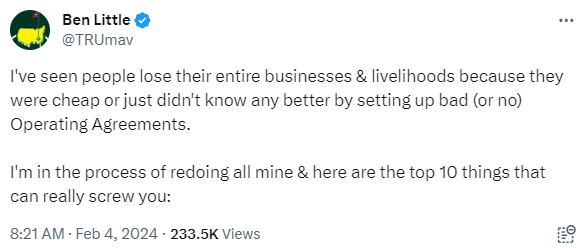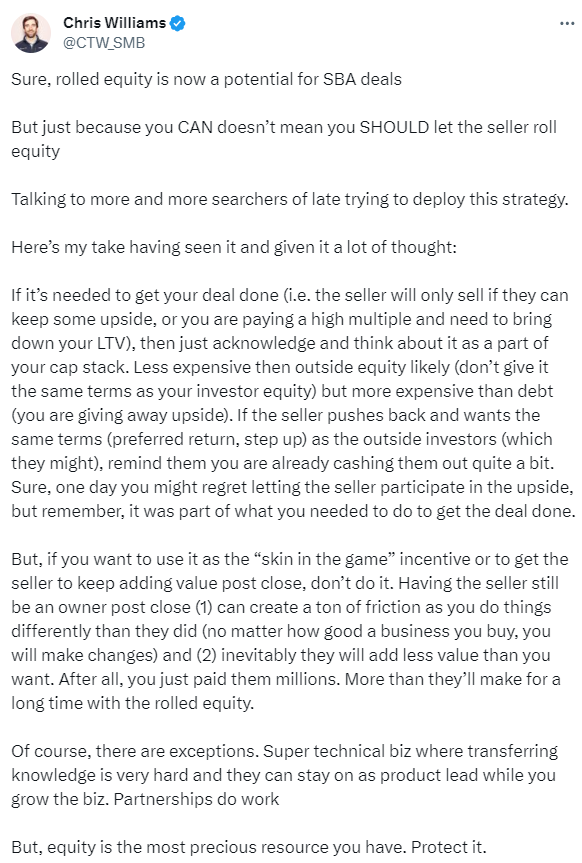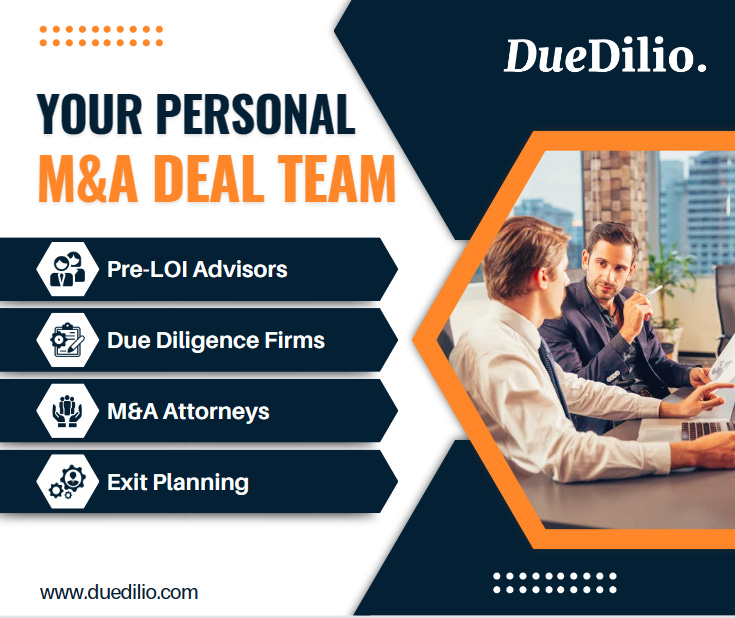What I Learned Last Week 2.9.2024
Curating the best M&A, SMB, and EtA-related content since 2020.
Hello Friends!
In this week’s issue of What I Learned Last Week:
📰 Articles
🧵 Best of X (Twitter)
🤔 Other - EtA, Barry Sternlicht
🗓️ Events
⚒️ Tools & Resources
💡 How I Can Help
This issue of The Business Inquirer is sponsored by Snowball
Build Your Snowball. Compound what matters.
Snowball is a private community of experienced entrepreneurial investors creating meaningful wealth.
How?
By building companies for the long term.
By investing directly in the SMB ecosystem.
By creating a life where personal growth, health, and strong relationships compound over the decades.
If you’re looking for a like-minded community of accomplished doers, a place for SMB deal flow, and a place for long-term thinkers... you’ve found it.
👋 Join the club at Snowball
SnowballClub.com
📰 Articles
Is the Silver Tsunami Real?
This is a great breakdown by Adam Hoeksema. The article examines whether there's a significant trend of baby boomer business owners selling their businesses, termed the "Silver Tsunami." It questions the reliability of SBA loan data in capturing this trend, noting that many small business sales fall below the radar of traditional financing methods. The article uses Google Search Trends to provide evidence of increasing interest in business sales, supporting the notion of an ongoing Silver Tsunami.
Questioning SBA Loan Data: SBA loan data may not fully capture small business sales trends.
Under-the-Radar Sales: Many sales are for amounts under $1 million, often financed outside of SBA loans.
Google Search Trends: An increase in searches related to selling a business suggests the Silver Tsunami is a real phenomenon.
— — — — — — — — — — — —
28 lessons from buying 20+ companies
The article by Xavier Helgesen offers insights into the business acquisition process, emphasizing the importance of due diligence, understanding seller motivations, and the value of honest communication. It highlights strategic approaches to valuation, negotiation, and post-acquisition integration.
Key takeaways include:
The critical role of due diligence in uncovering business realities.
Importance of understanding seller motivations for a smoother negotiation.
The value of transparent and honest communication throughout the acquisition process.
🧵 Best of X (Twitter)
P&L breakdown of a roofing franchise…
How to adapt and improvise if the due diligence uncovers some surprises…
On setting up a proper operating agreement…
Thinking of acquiring a law firm?
The pros and cons of rolled equity…
🤔 Other
EtA for Indie Hackers
Indie Hackers reached out and asked for my thoughts on the EtA space. I spent some time compiling my answers to their questions…and never heard back from them. Sharing my thoughts below…
Entrepreneurship through acquisition (ETA) is becoming more and more popular. What's your take on it?
As an avid supporter of paths that lead to financial independence and entrepreneurship, I am excited about the growing interest in EtA. While not new, EtA's recent acceleration and expanding recognition is nice to see. The evolution of the EtA ecosystem is marked by advancements in education, tools, and community building. A testament to this growth was evident at a recent EtA networking event I hosted in Miami, which attracted over 70 RSVPs and saw more than 50 attendees. The diversity of the group, with individuals from various cultures and backgrounds, was particularly inspiring.
Several key factors are propelling the growth of EtA:
The "Silver Tsunami": This phenomenon, characterized by baby boomers reaching retirement age, is creating a surge in available, cash-flow-positive businesses for acquisition. This generational shift presents a wealth of opportunities for new business owners.
Technological Advancements: The rise of technology has democratized entrepreneurship, making it accessible to a broader audience. The journey of scaling a business from an established base ("1 to 10") is distinct from starting from scratch ("0 to 1"), and not everyone chooses to embark on the latter. Today's environment facilitates the processes of starting, selling, or acquiring a business more seamlessly than ever before.
Economic and Societal Shifts: Increasingly, individuals are driven by a desire to break free from the traditional 9 to 5 job structure, opting instead to “bet on themselves”. This pursuit of financial freedom and autonomy is a strong motivator fueling interest in EtA. A common term I see being used to describe these individuals is “Corporate Refugees”.
In what ways is buying better/easier than building? And in what ways is it worse/harder?
Neither path is easy but there are certainly pros and cons to each approach.
Pros of Buying:
Immediate cash flow and revenue.
Established customer base and market presence.
Existing operational systems and employee expertise.
Creative financing structures
Cons of Buying:
Potential for inherited problems (e.g., outdated practices, underperforming staff).
Higher upfront capital requirement.
Due diligence is crucial and can be complex.
Cost of capital is increasing and SBA loans require a personal guarantee
Pros of Building:
Opportunity to shape company culture and operations from the start.
Potentially lower initial capital investment.
Flexibility to pivot and adapt the business model.
A lot of access to capital outside of SBA
Cons of Building:
Time-consuming with slower return on investment.
Higher risk with no guaranteed customer base.
Challenges in establishing brand recognition and market position.
How can indie hackers do ETA effectively (tips, processes, best practices, etc.)? Please be specific.
Indie hackers are uniquely positioned to excel in the world of EtA. Their diverse skill set, often encompassing areas like technology, operations, marketing, and sales, provides a significant advantage over those without such hands-on business experience. I think it’s also fair to say that indie hackers have a higher risk tolerance compared to the overall population.
Key Best Practices for Pursuing EtA:
Education and Resources:
Essential Reading: "Buy Then Build" by Walker Deibel is a foundational book for understanding the business buying process. It's an indispensable resource for anyone interested in EtA, offering deep insights into M&A procedures, terminology, and strategies.
Community Engagement: Engage with relevant online communities such as Indie Hackers, Searchfunder, Facebook Groups, Reddit, and X (Twitter). Participating in private WhatsApp groups focused on EtA can also be highly beneficial.
Stay Informed: Subscribe to newsletters like The Business Inquirer, SMB Deal Hunter, XO Capital, and They Got Acquired for ongoing insights and updates on EtA.
Crafting a Buyer Profile:
Analyze your strengths, experience, and objectives to define clear criteria for potential business acquisitions. Tools like ChatGPT are great at this type of analysis. It's crucial to target businesses that align with your skill set, passions, and long-term ambitions. A buyer profile will help to quickly filter through opportunities.
Assembling a Deal Team:
Collaborate: Utilize communities or platforms like DueDilio to build a robust deal team. This team typically includes a buy-side M&A advisor, an attorney, and a financial due diligence expert.
Independent Evaluation: Even if you have the capability to conduct due diligence, an independent evaluation is invaluable. With over 40% of businesses experiencing some form of financial discrepancy or fraud, expert due diligence is essential to identify and avoid potential pitfalls.
Preparation for Acquisition:
Be prepared for business acquisition. This includes establishing clear acquisition criteria, maintaining a professional online presence, securing a loan pre-qualification letter, and assembling a proficient deal team.
Like entrepreneurship, EtA can be stressful and take a toll both mentally and physically. Make sure to take care of your health throughout the process.
Targeting Larger Deals:
There's a prevailing wisdom in EtA to aim for the largest feasible transaction. The effort required to close and manage a $500k deal is often comparable to that of a $2M deal. Larger acquisitions not only offer greater potential returns but also demand similar operational efforts, so aim high.
Where's the best place to buy a business?
It depends. The effectiveness of a deal-sourcing strategy largely hinges on your specific buyer profile and the type of businesses you are targeting. Different marketplaces cater to varied business niches, so your choice should align with your acquisition goals.
For instance, if you're pursuing online opportunities, platforms like Acquire, Flippa, and Empire Flippers are known for their focus on digital businesses. Conversely, if you're more interested in traditional brick-and-mortar or 'Main Street' opportunities, a marketplace like BizBuySell or Private Market Labs would be more suitable. Niche marketplaces such as Microns and Tiny Acquisitions may also be appropriate for those pursuing smaller transactions.
The good news is that the rise of business listing aggregators – such as Kumo, Interexo, and BizNexus – has simplified the process. These platforms aggregate listings from various sources, offering business buyers a comprehensive view of available deals through a single interface.
However, a multi-pronged approach to deal sourcing often yields the best results. A combination of strategies, including exploring marketplaces, engaging with brokers, and initiating direct outreach to potential sellers, can significantly enhance your chances of finding the right business to acquire. This approach allows you to cast a wider net and increases the likelihood of discovering a business that truly aligns with your criteria and aspirations.
Is there any particular stage/type/characteristic of a company that is particularly good for getting a big return on investment?
The key to achieving high returns on investment in business acquisitions lies in finding a synergy between the buyer and the business. However, there are several fundamental characteristics to consider when identifying potential high-ROI opportunities:
Stable and Consistent Earnings: Target businesses that demonstrate a history of steady cash flow, especially those that have maintained financial stability across varying economic conditions.
Scalable Business Model: Look for businesses that have the potential for growth without a corresponding significant increase in costs. Scalability is a critical factor for long-term value creation.
Untapped Market Potential: Seek out businesses in niche markets that have not yet fully penetrated their market but show high growth potential. These businesses often offer a unique opportunity for expansion.
Strong Customer Base: Businesses with a loyal and diverse customer base present less risk. Particularly valuable are those with high customer retention or high switching costs, as they ensure a more predictable revenue stream.
Operational Inefficiencies: Identify businesses where you can add significant value through improvements in operations, marketing strategies, or technology. These inefficiencies represent untapped potential for enhancing profitability and efficiency.
Clear Exit Opportunities: Consider businesses that operate in markets with evident exit strategies, such as acquisition by strategic buyers or investor groups like private equity firms. Having a clear exit path can significantly influence the ROI.
Anything else you think is relevant?
A couple of additional tips:
Make sure you understand how a business actually makes money
Don’t fall into analysis paralysis. If you've found a deal that aligns well with your criteria and shows good potential, be decisive and pursue it.
Have a well-thought-out plan for how you will operate and scale the business post-acquisition. Ideally, this strategy should include operational improvements, market expansion plans, and long-term growth objectives.
Have a margin of safety. Very often, business performance temporarily declines when new ownership takes over. Be prepared.
Take care of your health and relationships
— — — — — — — — — — — —
Barry Sternlicht
Barry is one of the most prolific dealmakers in the real estate sector. He’s co-founder, Chairman, and CEO of Starwood Capital Group, founder of Starwood Hotels & Resorts, and has been the CEO of 6 publicly traded companies throughout his career.
He’s recently appeared on a few panels and podcasts that I’ve thoroughly enjoyed listening to. He shares tons of stories and lessons from his life. I recommend watching these two…
Barry Sternlicht's Stories from Building a $120 Billion Empire
Fireside with Barry Sternlicht, Chairman & CEO, Starwood Capital Group
🗓️ Events
MIT ETA Conference (Feb 16) - Cambridge, MA
Wharton ETA Club (Spring 2024) - Philadelphia, PA
SMBash 2024 (Apr 18-20) - Salt Lake City, UT
M&A Launchpad Conference (May 11) - Houston, TX
Capital Camp (May 21-24) - Columbia, MO
Main Street Summit (Oct 9-10) - Columbia, MO
How did you like this issue of the newsletter?
⚒️Tools & Resources
I want to share some tools & resources that I have found helpful. Please note that some of these are paid sponsors of the newsletter.
PrivSource - PrivSource helps you source deals and connect with transaction partners without ever paying a success fee.
X5 Deals - Proprietary deal sourcing for a great price. They do the outreach and send you relevant, actionable deals directly into your inbox.
Rejigg - Platform that connects searchers/investors directly with owners of off-market small businesses ($1M - $10M of revenue) considering exits. All deals are sourced by the Rejigg team. Their team adds 7 to 10 new deals each week.
Interexo - Curated deal flow and data solutions. Since 2016 Interexo has been M&A industry’s trusted source for deal flow, with extensive coverage of industry data, from Private Equity to Lenders, Hedge Funds, Brokers, and more.
Smash.vc - Whether you're looking to sell minority stakes in your business to take some chips off the table, looking for a partner to acquire an asset, or needing capital to complete an SBA deal, we'd love to chat with you.
Search Fund Coalition - community for the Entrepreneurship Through Acquisition ecosystem. Monthly events and meetups for acquisition entrepreneurs.
Deal Sourcing Guide - a comprehensive list of business marketplaces, brokers, deal origination firms, and more.
💡 How I Can Help
Whenever you’re ready, here are a few ways for us to work together…
Schedule 1:1 consulting on deal sourcing, due diligence, M&A ecosystem, newsletters, entrepreneurship, or anything else you’d like to discuss
Promote your brand to business buyers, investors, SMB owners, and other M&A participants by sponsoring this newsletter
Assemble your M&A deal team with DueDilio
If you enjoyed reading this newsletter, why not share it?










